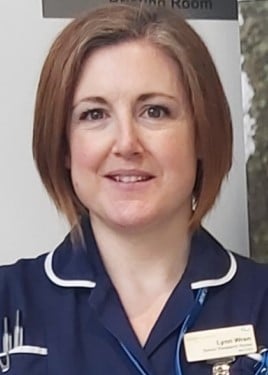Working on COVID-19 research: #TeamMKUH’s Lynn Wren

Milton Keynes University Hospital has several staff taking part in critical research to combat COVID-19.
The Trust is involved in several studies supported by NIHR (National Institute for Health Research). One of the MKUH staff at the forefront of the work is Lynn Wren, the Trust’s Senior Research Nurse and Cross-Speciality Lead whose role, like many others, has changed since the start of the COVID-19 outbreak.
Lynn is now dedicated to overseeing COVID-19 research, supervising the collation of information from the local clinical research network and regularly updating the research team and relevant healthcare teams.
Lynn said: “We are helping the country and the world to have a better method of fighting this virus. I want to learn more about it, so that we can help turn the tide on the amount of patients affected by the pandemic.
“The co-ordinator decides which patients need to be seen, who is going to see them and who is collecting the data. When we enter clinical areas, we must ensure we are protected and protect those in the area by putting on personal protective equipment (PPE), such as a mask, gloves, apron, gown and headscarf. We approach patients about taking part in research, recruiting them if appropriate and speak to clinical teams about their patients and the research options.”
What studies are you currently working on and what do they involve?
“We’re working on ISARIC, which is an observational study collecting, processing and storing blood samples, swabs and data from people with COVID-19. We are also recruiting to RECOVERY, which involves randomising those patients to different treatment options and comparing their outcomes to see which treatment has the best results for patients. The drugs include antiretrovirals used for HIV, corticosteroids, hydroxychloroquine used for malaria and we are adding more as the trial progresses. In GenOMICC we collect blood samples, with their consent, to help identify genes that make some people more susceptible to COVID-19. We have most recently opened PRIEST, which is looking at optimising the triage during a pandemic to get the most accurate method of predicting severe illness. We also have UKOSS, which is looking at anonymised data collected from pregnant women, again with their consent, with the virus.”
What are the biggest challenges of working in COVID-19 research?
“With the newness of it all, the changing landscape of the studies and current situation, you have to adapt. It’s also emotionally difficult as quite a few of our patients are not making it out of hospital. We are required to follow our patients’ journeys with this virus, whether they’re younger or older and that can be tough if there isn’t a positive outcome. There is also the personal concern about keeping ourselves and our families safe.”
How do you and your team support each other?
“We’ve got everybody working together, we’re all cross-covering the studies, talking and taking time out for each other. I set up a mental health check-in, where I send a WhatsApp message to my team with a diagram of coloured hearts to indicate how they are feeling. They don’t need to verbalise anything, just message me with the correlating coloured heart to let me know how they’re getting on. The different colours can mean ‘I’m okay’ or ‘I’m struggling’. It’s just a way people can ask for help without having to face-to-face.”
What do you enjoy most about working in research?
“That we are helping the country and the world to have a better method of fighting this virus. We want to learn more about it, so that we can help turn the tide on the amount of patients affected by the pandemic.”
Find out more about NIHR-supported studies into COVID-19 on the NIHR website.
Last Modified: 11:20am 04/05/2020
For all media enquiries please contact [email protected]
